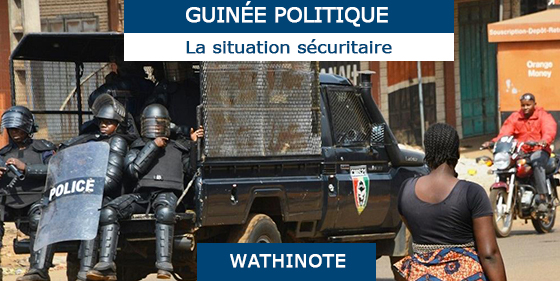Author: Overseas Security Advisory Council (OSAC), US Department of State
Date of publication: 2019
*Les Wathinotes sont des extraits de publications choisies par WATHI et conformes aux documents originaux. Les rapports utilisés pour l’élaboration des Wathinotes sont sélectionnés par WATHI compte tenu de leur pertinence par rapport au contexte du pays. Toutes les Wathinotes renvoient aux publications originales et intégrales qui ne sont pas hébergées par le site de WATHI, et sont destinées à promouvoir la lecture de ces documents, fruit du travail de recherche d’universitaires et d’experts.
There is considerable risk from crime in Conakry. The city experiences a wide spectrum of criminal activity. Crimes of opportunity (e.g. pickpocketing, purse snatching, theft of valuables from vehicles, assaults, residential burglaries) are of particular concern. In particular, low-level criminal activity occurs in areas where people congregate, such as markets. Criminals may take advantage of foreigners attempting to navigate these crowded locations.
Travelers in vehicles have been victims of opportunistic crime in which criminals exploit unlocked car doors or open windows to steal personal belongings or to carjack the driver. Motorists should only roll down windows enough to communicate when necessary.
The Embassy is aware of several armed robberies involving assault rifles, pistols, knives, and machetes. Although most of these attacks have taken place outside the capital, some have also occurred within the city limits.Sexual assault and rape, primarily against women, does occur. Women should exercise caution when traveling alone.
Residential burglaries are more frequent during the rainy season, as torrential rains naturally mask sounds associated with criminal activity, such as breaking glass or attempts to breach perimeter walls. Criminals often target locations with perceived vulnerabilities that they can exploit to gain access. Ineffective perimeter walls, minimal lighting, weak window grilles, and poorly paid or trained guards make home invasions more inviting. Employing vetted and alert security guards, as well as maintaining effective compound and perimeter security measures mitigate the threat from home invasion.
There is minimal risk from terrorism in Conakry. No known indigenous terrorist organization operates in the country. However, Guinea’s borders remain porous, creating the potential for spillover from neighboring countries that have multiple active terrorist groups operating within their territories (Mali) or have been targeted previously for terrorist attack (Côte d’Ivoire)
There have been several reports of local victims of online financial scams originating or claiming to originate from Conakry. These scams typically involve a con artist attempting to convince a victim to send money via email. Schemes can include purported lotteries, online dating services, gifts, bank overpayments, or even helping a new friend in trouble. Scams often offer to sell diamonds or gold. In general, if an offer sounds too good to be true, it probably is. Many foreigners have lost large quantities of money, and put themselves in danger by engaging in such deals.
There is minimal risk from terrorism in Conakry. No known indigenous terrorist organization operates in the country. However, Guinea’s borders remain porous, creating the potential for spillover from neighboring countries that have multiple active terrorist groups operating within their territories (Mali) or have been targeted previously for terrorist attack (Côte d’Ivoire). Land border controls are overwhelmed, and only present in specific locations. There are many locations to cross borders without passing through areas with government control.
Protests are common, especially in Conakry; sporadic demonstrations regularly occur across the country, some of which have turned violent and resulted in injuries and/or fatalities. With numerous political opposition parties and special interest groups, some form of protest occurs once a month on average
There is moderate risk from civil unrest in Conakry. Following local elections in 2018, there were violent protests in Conakry and other cities, including Boke, Kamsar, Labe, Kankan, and Dalaba, after opposition parties disputed the results. At least ten people died, including five children in an alleged arson attack in central Guinea and two individuals during clashes between protests and security forces in Conakry. There have also been reported arrests of protesters and rioters in some areas.
Protests are common, especially in Conakry; sporadic demonstrations regularly occur across the country, some of which have turned violent and resulted in injuries and/or fatalities. With numerous political opposition parties and special interest groups, some form of protest occurs once a month on average. Planned and approved protests/marches often remain peaceful. However, crowds tend to be slow to disperse, resulting in congested traffic, at a minimum. It is not uncommon for gathered youth to throw stones at passing vehicles. Less common, but still not rare, are burning tires blocking streets.
Security forces are generally quick to respond to demonstrations and mob activities. Police often discharge firearms in the air or use tear gas to disperse crowds. There have been incidents where bystanders are by falling rounds, incurring serious injury/death. Avoid large gatherings, as even peaceful demonstrations could turn confrontational or involve police use of force while dispersing participants. Signs of escalating activity include large groups increasing in size and agitation, debris in the road, many drivers going the wrong way down a road and using hand gestures to turn, or seeing multiple trucks carrying gendarmes.


Commenter